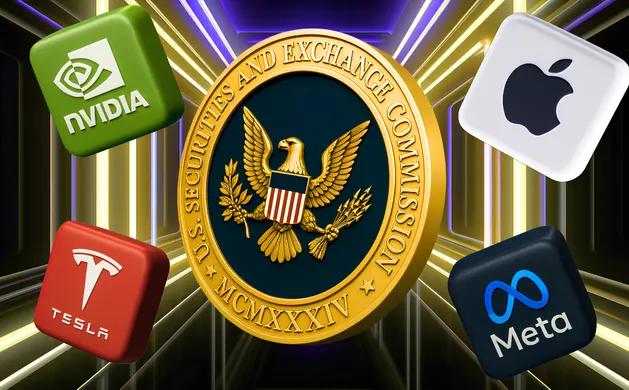BlackRock’s Bitcoin ETF Now Outpaces Its S&P 500 Fund

GM. BlackRock’s Bitcoin ETF is now earning more than its S&P 500 fund, as Bitcoin tops $109K and institutional inflows push IBIT past $75 billion.
Meanwhile, the Trump family has made $620 million from crypto, a Solana treasury firm raises $112 million, and Ripple applies for a national bank charter.
Wall Street, politics, and protocols are converging fast. 👇
BlackRock’s Bitcoin ETF Now Outpaces Its S&P 500 Fund
BlackRock’s iShares Bitcoin Trust (IBIT) has overtaken the firm’s S&P 500 ETF in annual fee revenue, generating $187.2 million compared to IVV’s $187.1 million, according to Bloomberg. IBIT holds $75 billion in assets and charges a 0.25% fee, while IVV, nearly nine times larger, charges just 0.03%.
“IBIT overtaking IVV in annual fee revenue is reflective of both the surging investor demand for Bitcoin and the significant fee compression in core equity exposure,” said Nate Geraci. The fund has seen net inflows in 17 of the last 18 months since its launch in January 2024.
IBIT now holds over 55% of all Bitcoin ETF assets and has attracted $52 billion of the $54 billion in total net inflows across the category. Both institutional and retail capital have poured in as US regulators cleared a path for mainstream access.
Bitcoin’s price has climbed past $109,000 today, coinciding with strong demand from pensions, hedge funds, and banks. IBIT ranks among the top 20 ETFs by trading volume, according to Bloomberg Intelligence data.
Trump Family Made $620M From Crypto Ventures
The Trump family has earned approximately $620 million from various crypto ventures, according to Bloomberg's latest wealth breakdown. These include $390 million from World Liberty’s token sale and $150 million from the Official Trump memecoin launched in January. The family's net worth remains at $6.4 billion, though this marks the first detailed account of their digital asset holdings.
Their crypto portfolio spans NFTs, mining ventures, and token investments tied to Donald Trump’s broader political brand. They also hold a 20% stake in American Bitcoin, a mining firm expected to go public this year. The TRUMP token has fluctuated since launch but maintains a sizable $1.7 billion market cap as of this week.
Solana Treasury Firm Closes $112M Funding Round
DeFi Development Corp has secured $112.5 million via a private placement deal to expand its Solana holdings and fund operations. The firm will use $75.6 million for a prepaid forward stock transaction, with the rest dedicated to general corporate use, including SOL accumulation. The notes carry a 5.5% annual interest rate and mature in 2030, with added conversion features for investors.
DDC, which rebranded in April, has evolved from real estate tech into one of the largest publicly listed Solana-focused firms. The company is staking SOL for both internal revenue and external clients and recently partnered with former Kraken executives. DDC stock currently trades near $19, and the firm holds over $100 million in SOL across its wallets.
Ripple Applies For US National Bank Charter
Ripple has filed an application for a national bank charter from the Office of the Comptroller of the Currency, following a similar move by Circle earlier this week. CEO Brad Garlinghouse confirmed the news, stating that the license would provide Ripple with both state and federal oversight. The bank entity would help Ripple expand services around its stablecoin RLUSD and custody reserves.
RLUSD currently holds a market cap of $469 million, far below stablecoin leaders Tether and USDC. Ripple’s push for a banking license comes amid new rules under the GENIUS Act, which are reshaping how stablecoin firms operate in the US The firm also applied for a Federal Reserve master account through its Standard Custody unit.
Data of the Day
Spot trading volume on centralized exchanges fell to $1.07 trillion in June, reaching the lowest level in nine months amid a muted altcoin market. Data from The Block shows volume has declined 63% since December's $2.94 trillion peak, signaling weaker retail activity. Analysts say the current cycle is dominated by institutional Bitcoin accumulation, sidelining smaller coins.
In contrast, decentralized exchanges recorded $390 billion in June volume, with the DEX-to-CEX ratio reaching record highs. Presto Research and Kronos analysts point to trust erosion, fee differences, and user incentives as key drivers. Traders increasingly favor self-custody, open access, and speculative programs available only on DEXs.

More Breaking News
- The ECB will pilot a blockchain euro settlement system in 2026 to connect distributed ledgers with the eurozone’s core payment rails.
- Circle announced Gateway, a multichain liquidity tool for USDC that enables unified balances and real-time access across major blockchains.
- Vitalik Buterin warned Ethereum risks losing its soul unless decentralization becomes a concrete guarantee rather than just a catchy slogan.
- Figma disclosed $70 million in Bitcoin ETF holdings in its IPO filing and reserved $30 million in USDC for further crypto investments.
- Robinhood minted 213 tokenized US stocks on Arbitrum for $5 in gas fees as it gears up for EU-based tokenized RWA equity trading.
- Italy’s Banca Sella bank is testing stablecoin custody using Fireblocks software in a private trial that may later expand to retail customers.
- Coinbase acquired token ops startup Liquifi, its fourth deal this year, to add automated compliance and vesting to its issuance suite.
- A judge ruled Celsius may proceed with its $4 billion lawsuit accusing Tether of violating terms tied to a massive Bitcoin loan liquidation.
- Belgium’s KBC Bank plans to offer Bitcoin and Ether to retail investors through its Bolero platform, pending CASP registration approval.
For the latest updates on digital asset markets, follow us on X @Datawalletcom.
.webp)
Written by
Jed Barker
Editor-in-Chief
Jed, a digital asset analyst since 2015, founded Datawallet to simplify crypto and decentralized finance. His background includes research roles in leading publications and a venture firm, reflecting his commitment to making complex financial concepts accessible.







